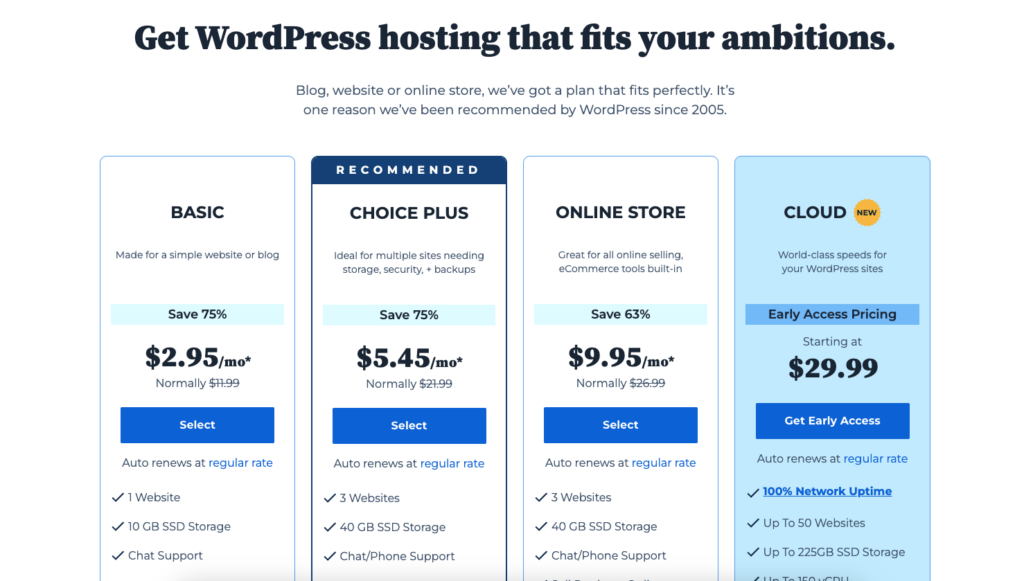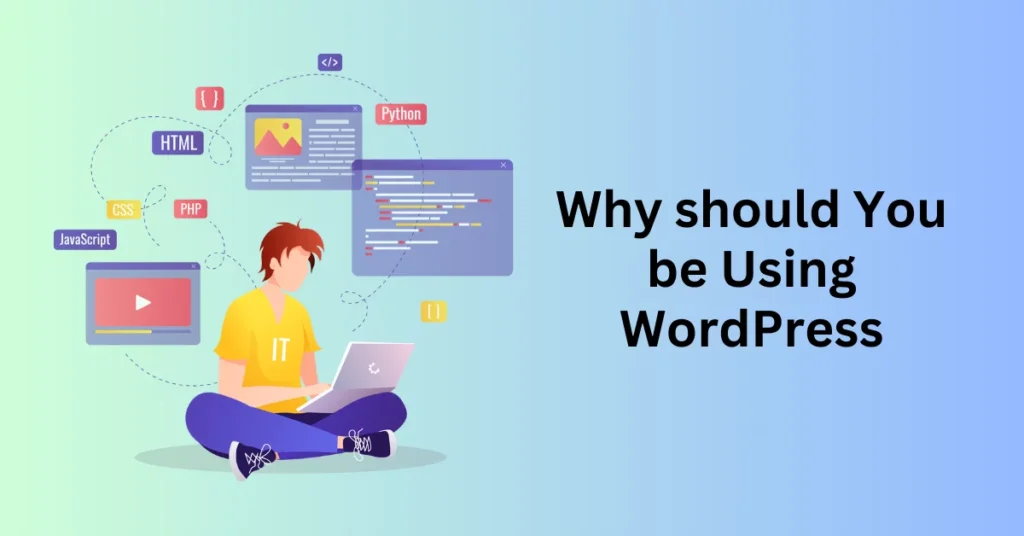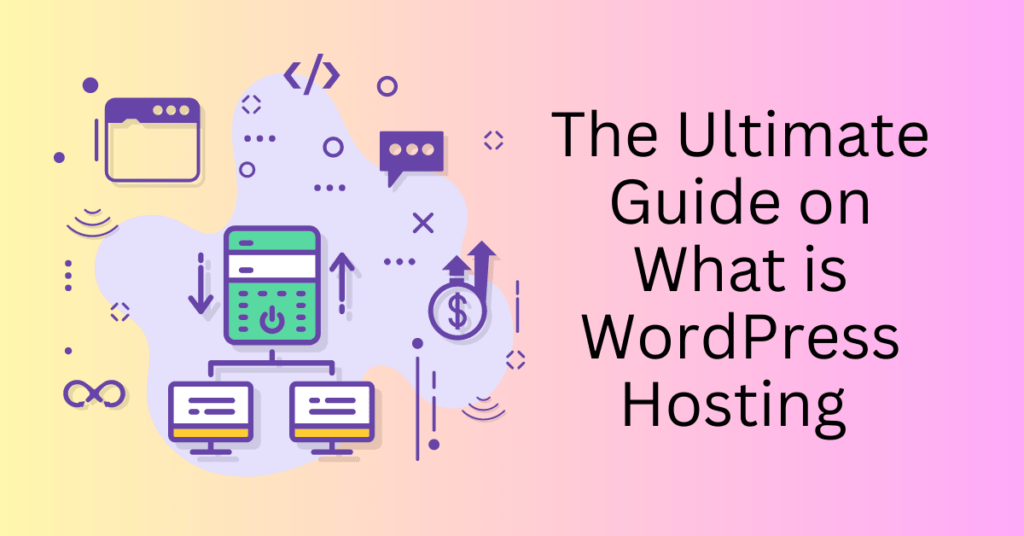In the ever-evolving landscape of web development and online presence, choosing the right platform for your website is crucial. WordPress is a powerhouse in the world of website creation and management. Whether you’re a small business owner, a budding blogger, or an established eCommerce entrepreneur, WordPress offers a versatile and robust solution that caters to a wide range of needs.
From its unparalleled flexibility and extensive customization options to its active community and vast ecosystem of plugins, WordPress has established itself as a leading choice for building and maintaining websites. In this blog, we’ll explore the reasons why WordPress should be at the top of your list when it comes to selecting a platform.
Start Your WordPress Website Today
Why You Should Use WordPress

We’ve compiled five reasons that have convinced ourselves (and others) why WordPress is worth building on. Your choice in what you build is deeply personal. And we want to show you the best side of WordPress. We really believe that you can find success with it. That’s why we heartily recommend WordPress to you for these reasons:
1. Flexibility and Customizability
WordPress stands out as the premier choice for small business owners and individuals launching new websites due to its exceptional flexibility and customizability. This reputation is well-deserved, as WordPress’s primary strength lies in its expansive ecosystem of themes and plugins. Themes dictate the overall design and layout of your website. It provides a visual framework, while plugins enable specific functionalities, enhancing your site’s features and capabilities.
This modular design philosophy empowers website owners to start with a basic setup and incrementally incorporate advanced features as their business evolves, all without requiring a complete redesign. This adaptability is a key reason why WordPress is favoured by so many users.
With millions of developers actively engaged with the platform, virtually every problem has been addressed. Besides, there are solutions available either as free plugins/themes or at a reasonable cost. This extensive pool of resources and community-driven innovation ensures that WordPress remains at the forefront of web technologies and trends, offering a platform that is both current and future-proof.
Moreover, the flexibility of WordPress extends to even the creation of small plugins. For instance, you can leverage tools like ChatGPT to build a custom plugin in just a few hours. Hence, showcasing the platform’s remarkable adaptability and ease of use.
2. SEO Friendly
If you follow SEO experts on social media, you’ll notice that WordPress is often their preferred choice. This preference stems from WordPress’s ability to simplify on-page SEO while also offering extensive options for detailed technical SEO. In contrast, platforms like Wix or Squarespace tend to provide a more streamlined, less customizable approach to routine SEO tasks. These platforms offer basic SEO functionalities that are often sufficient for beginners but lack the depth and flexibility found in WordPress. For SEO professionals seeking to leverage advanced techniques and custom solutions, WordPress’s extensive capabilities and flexibility make it the go-to choice for maximizing SEO potential.
SEO Plugins and Built-in Functionality
WordPress offers a robust array of options for implementing SEO through various plugins, each tailored to different needs and preferences. Rank Math, Yoast SEO, and All in One SEO (AIOSEO) are some popular SEO plugins for WordPress. Each provides both free and premium versions loaded with powerful SEO optimization features. With this, WordPress allows you to tailor SEO functionalities precisely to your business or website’s needs. Hence, ensuring you can achieve your desired SEO outcomes.
Beyond these well-known plugins, there are additional tools designed to enhance your understanding of your website’s performance and optimize specific SEO tasks. For instance, Google has contributed to the WordPress ecosystem by developing its own Site Kit plugin. This plugin integrates Google Analytics, Search Console, Tag Manager, and AdSense directly into your WordPress dashboard, offering seamless access to essential data and tools.
Looking beyond SEO plugins, WordPress is inherently designed with SEO in mind. It offers extensive customization options, such as flexible permalink structures, link architecture through parent/child relationships, comprehensive sitemap capabilities, and mobile responsiveness. These features collectively ensure that WordPress is not just a platform with powerful SEO plugins, but one that is fundamentally built to support and enhance your SEO efforts from the ground up.
3. Community Support
While it might not be the most glamorous reason, community support is a significant advantage of using WordPress. The platform boasts an unparalleled network of support resources. This includes countless Reddit threads, questions on Stack Overflow, and various other free forums dedicated to assisting users with WordPress. This extensive community presence ensures that you can find help and solutions for virtually any issue you may encounter.
In addition to the broad WordPress community, there are also specialized communities focused on highly used products and plugins within the WordPress ecosystem. These niche groups are designed to help you maximize the benefits of your favourite tools and solutions. Hence, providing targeted advice and support tailored to your specific needs. This depth of community support makes WordPress a platform where you can be confident that help is available.
4. Ecommerce Feature
You might be surprised to learn that WordPress, combined with the free WooCommerce plugin, is one of the largest and most powerful eCommerce solutions available. While Shopify often dominates the eCommerce conversation due to its exclusive focus on online stores, WordPress with WooCommerce offers a robust and versatile alternative.
WooCommerce provides a comprehensive range of features tailored to the needs of online store owners, including:
- Inventory Management: Easily track and manage your stock levels, set product attributes, and organize your inventory efficiently.
- Payment Processing: Support for multiple payment gateways, allowing customers to pay using various methods, including credit cards, PayPal, and more.
- Shipping Options: Configure shipping methods and rates, integrate with shipping carriers, and offer flexible shipping options to your customers.
- Tax Calculation: Automatically calculate taxes based on customer location and product type, simplifying compliance with tax regulations.
- Order and Customer Management: Streamline order processing, manage customer accounts, and keep track of order history and customer interactions.
- Tips and Donations: Enable customers to add tips or make donations during the checkout process.
With a WooCommerce-optimized theme, you can further enhance your store by adding visually appealing product pages, streamlined checkouts, and attractive storefronts. This customization capability allows you to create a unique and engaging shopping experience tailored to your brand and audience.
5. Website Scalability
WordPress is designed to scale seamlessly, making it a great choice for businesses of any size. Whether you run a small site with a few hundred visitors or a high-traffic platform with millions, WordPress can handle the growth. You won’t need a complete redesign or migration to another system. This flexibility is valuable for businesses expecting growth, allowing them to expand without extensive rework or extra resources.
Notably, WordPress powers a diverse range of websites, from prominent platforms like WhiteHouse.gov to new sites hosted on basic Bluehost plans. This wide-ranging usage demonstrates WordPress’s capability to grow with your needs, providing reassurance that it can support your business’s expansion.

One of the key reasons businesses seek scalability is to effectively manage increased online traffic. While WordPress itself is equipped to handle high traffic volumes, its performance is closely tied to the hosting environment. Similar to proprietary site builders, hosting providers offer various tiers to accommodate increasing traffic. Upgrading from shared hosting to managed or cloud hosting is often a straightforward process that supports higher traffic loads.
To further optimize performance, consider implementing optimization plugins, caching mechanisms, and Content Delivery Networks (CDNs). Additionally, maintaining discipline with plugin use—ensuring they are necessary and well-maintained—can significantly enhance your site’s efficiency and responsiveness. By leveraging these strategies, you can ensure that your WordPress site remains robust and performs optimally as it scales.
Start Your WordPress Website Today
Misconceptions about WordPress
There is a lot of old and misleading information about there concerning WordPress. We’ll clarify what we can so you can consider it for your projects instead. Many people dismiss WordPress out of hand without knowing it might be the optimal solution for their website.
Performance Issue
The belief that WordPress is inherently slow is largely a misconception. While an inadequately optimized WordPress site can indeed suffer from slow performance, proper optimization techniques and high-quality hosting can make it extremely fast and efficient.
Here are some key strategies to enhance the speed of your WordPress site:
- Caching Plugins: Implementing caching plugins such as WP Rocket or W3 Total Cache can lead to significant improvements in load times. These plugins store static versions of your pages and serve them to users. Hence, reducing the need for repeated database queries and server processing.
- Content Delivery Networks (CDNs): Utilizing a CDN can greatly speed up access to your site’s static content. CDNs distribute your site’s assets (images, CSS, JavaScript) across a network of global servers. This is so users can download content from a server geographically closer to them, thus reducing latency and improving load times.
- Database Optimization: Regularly optimizing your database and implementing query caching can significantly reduce server response times. This involves cleaning up and optimizing database tables, reducing overhead, and ensuring efficient data retrieval.
- Selective Plugin Usage: Avoid performance issues by removing unused plugins and only keeping those that are essential to your site’s functionality. Using a higher-quality hosting plan can also mitigate performance issues associated with having more plugins, as better hosting environments can handle increased resource demands more efficiently.
Management Issue
Managing a WordPress site can indeed involve frequent updates, especially when compared to platforms like Weebly. However, this aspect is not as cumbersome as it might seem, and it is far from the entire story.
One of the significant advantages of WordPress is the level of freedom it provides in site building. Whether you prefer the Classic Page Editor or a more advanced visual builder like Elementor, WordPress allows you to choose and customize your workflow according to your comfort and needs. This flexibility can actually make site management easier rather than more challenging.
The real measure of ease in web design and development often boils down to functionality. Essentially, whether you can implement your ideas effectively. On platforms like Wix or Squarespace, the answer to such functionality queries is usually binary. Either you can do it or you can’t. In contrast, WordPress offers a broader range of possibilities and often allows you to realize your ideas.
In WordPress, you’re more likely to find a way to achieve your vision rather than abandoning it due to limitations. This flexibility and extensive customization make it one that can be easier to manage in the long run.
Security Issue
While WordPress sites can be vulnerable if not properly maintained, the platform itself offers robust security when best practices are followed:
- Regular Updates: Keeping the WordPress core, themes, and plugins up to date is crucial for addressing security vulnerabilities. Updates often include patches and fixes for known issues, which help to protect your site from potential threats.
- Security Plugins: Implementing security plugins like Wordfence or Sucuri can provide additional layers of protection. These plugins offer features such as firewall protection, malware scanning, and login security, enhancing the overall security of your site.
- Managed Hosting Providers: Many managed hosting providers include built-in security features as part of their service. These features often encompass regular backups, automatic updates, and enhanced security protocols, adding an extra layer of protection for your site.
Managing security requires more hands-on effort compared to some other platforms. However, this effort is a minor trade-off for the extensive features and customization it provides. Keeping your site secure is straightforward with the right practices and tools. Regular updates, effective security plugins, and a reliable hosting provider help keep your WordPress site well-protected. With these measures, you can maintain a secure site without too much worry.
Old Technology
WordPress has been around for over 20 years, but its codebase is not outdated. Each year, WordPress updates its core with the latest versions of PHP, JavaScript, jQuery, and SQL. Thousands of volunteers contribute daily, ensuring the platform stays current. This ongoing support keeps WordPress capable of meeting the needs of developers, site managers, marketers, and those handling technical upgrades.
Despite its long history, WordPress evolves and adapts, staying relevant in technical SEO. The platform hasn’t reached its peak in eCommerce capabilities and continues to lead in internet technology. While some elements, like the Admin dashboard UI, may appear dated, the core functionalities and key features are consistently improving.
Additionally, the vibrant ecosystem of plugins and themes available for WordPress is pushing the boundaries of what’s possible. This dynamic environment fosters innovation and enhances WordPress’s capabilities, offering a modern and powerful platform far beyond what might be suggested by those who view it as obsolete.
In reality, WordPress continues to be at the forefront of web technology and remains highly relevant in both technical SEO and eCommerce.
WordPress Vs Other Popular Platforms
When creating a new website, evaluating your options is essential. WordPress often comes up in these discussions, alongside several other popular solutions. Here’s a quick comparison of WordPress with some of its key competitors:
WordPress vs. Wix
WordPress: Known for its power and flexibility, WordPress is an open-source platform that offers extensive customization through its vast library of plugins and themes. It is ideal for users who need advanced features and control over their website’s design and functionality. WordPress is suitable for building everything from simple blogs to complex, multi-functional websites.
Wix: In contrast, Wix is designed for ease of use with its drag-and-drop interface, making it an excellent choice for beginners who want a straightforward setup. Wix provides a user-friendly experience but comes with limitations in terms of customization and scalability. As you add more features, Wix can become quite expensive, potentially making it less cost-effective for growing websites.
WordPress vs. Squarespace
Squarespace: Renowned for its visually stunning templates and elegant designs, Squarespace is particularly popular among creatives looking for a sleek and polished website. It offers an intuitive user experience and beautiful design options but has fewer customization capabilities compared to WordPress.
WordPress: The open-source nature of WordPress allows for extensive flexibility and control over both design and functionality. With a wide range of plugins and themes, WordPress can achieve a level of customization that Squarespace can’t match. While Squarespace is easier to use out of the box, WordPress offers greater potential for creating unique and complex websites tailored to specific needs.

WordPress vs. Shopify
Shopify: Shopify is a specialized platform renowned for its robust eCommerce features and straightforward setup. It offers a user-friendly interface and tools specifically designed for managing online stores. Hence, simplifying the process of launching and operating an online shop.
WordPress: While Shopify is well-known for its eCommerce strengths, WordPress, with WooCommerce plugins, provides a highly versatile and customizable eCommerce solution. WordPress’s extensive ecosystem of developers and plugins offers a broader range of features and integrations. Although Shopify focuses on eCommerce, WordPress supports a wide variety of functionalities beyond just online shopping.

In Summary: Both platforms have their advantages. Shopify excels with its focused eCommerce capabilities, but WordPress stands out for its flexibility, extensive customization options, and adaptability, making it a strong contender for a diverse range of website needs.
Start Your WordPress Website Today
Using WordPress for Blogging
WordPress began as a blogging platform and remains an excellent choice for bloggers due to its ease of use and extensive features. The platform’s user-friendly content management system simplifies the process of creating and organizing blog posts. Bloggers can easily publish content without needing advanced technical skills, making WordPress an accessible option for both beginners and experienced writers.
The platform offers thousands of customizable themes specifically designed for blogging. These themes make it easy to achieve a professional and visually appealing blog design, allowing you to select or modify a theme that fits your style and branding. WordPress’s extensive plugin ecosystem further enhances blogging capabilities, providing tools for SEO, social media integration, and more. These plugins help improve visibility, engagement, and overall blog performance.
WordPress also includes built-in features such as a robust commenting system, multi-author management, and comprehensive media tools. These features support interactive and collaborative blogging, making it easier to engage with readers and manage content. The platform’s scalability ensures that your blog can grow alongside your audience and content, providing a long-term solution that adapts to your evolving needs.
Using WordPress for eCommerce
WordPress is a leading choice for eCommerce due to its flexibility and powerful plugins. One of the standout features is WooCommerce, which transforms a standard WordPress site into a fully functional online store. With WooCommerce, you gain access to a range of eCommerce features such as product management, inventory tracking, and advanced reporting tools. This plugin, along with others available in the WordPress ecosystem, provides everything you need to set up and run a successful online store.
Additionally, WordPress offers an extensive library of plugins and customizable themes, such as Divi, which allow you to create a unique and responsive design for your store. This flexibility ensures that you can tailor your store’s appearance and functionality to align perfectly with your brand’s identity. The platform’s built-in SEO features, combined with various SEO plugins, enhance your store’s visibility in search engines, making it easier for potential customers to find you.
WordPress also integrates seamlessly with a range of tools like Google Analytics, Google Merchant, and other advertising platforms, allowing you to track performance and execute effective marketing strategies. Its scalability supports the growth of your eCommerce business, accommodating increased traffic and expanding functionality. Additionally, WordPress supports numerous payment gateways and shipping options, providing the versatility needed to handle various aspects of online transactions and logistics.
Selecting the right eCommerce plugins is crucial for enhancing both functionality and user experience. Essential plugins can streamline operations, improve customer engagement, and optimize various aspects of your store, ensuring that it meets your specific business needs.
Final Thoughts: Why should You be Using WordPress
As we conclude, the advantage of WordPress to be your top choice for building and managing your website is clear. WordPress offers unparalleled flexibility, allowing you to create anything from a basic blog to a sophisticated eCommerce site. It adapts to your changing needs with a wide range of themes and plugins that let you customize your site to your vision. Additionally, a vibrant community of developers and users provides continuous support and innovation.
WordPress is highly scalable, meaning it can grow with you whether you’re starting small or expanding your online presence. Its open-source nature keeps it at the cutting edge of technology, with constant improvements and new features. While other platforms have their strengths, WordPress’s versatility, customization options, and strong support make it an exceptional choice for anyone looking to establish a robust online presence.


